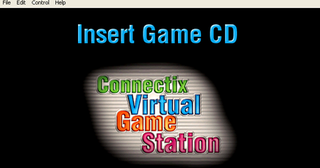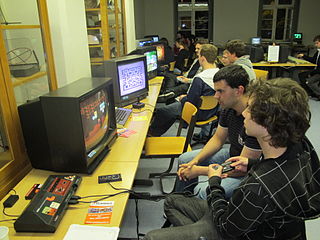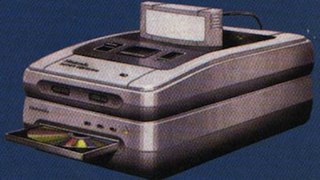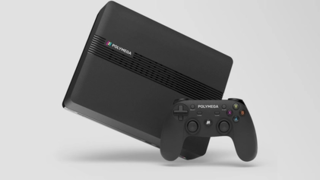
The PlayStation is a home video game console developed and marketed by Sony Computer Entertainment. It was released in Japan on 3 December 1994, in North America on 9 September 1995, in Europe on 29 September 1995, and in Australia on 15 November 1995. As a fifth-generation console, the PlayStation primarily competed with the Nintendo 64 and the Sega Saturn.

The Dreamcast is the final home video game console manufactured by Sega. It was released on November 27, 1998, in Japan; September 9, 1999, in North America; and October 14, 1999, in Europe. It was the first sixth-generation video game console, preceding Sony's PlayStation 2, Nintendo's GameCube, and Microsoft's Xbox. The Dreamcast's 2001 discontinuation ended Sega's 18 years in the console market.

The Virtual Game Station was an emulator by Connectix that allows Sony PlayStation games to be played on a desktop computer. It was first released for the Macintosh, in 1999, after being previewed at Macworld/iWorld the same year by Steve Jobs and Phil Schiller. VGS was created by Aaron Giles. The recompiling CPU emulator was written by Eric Traut.

Connectix Corporation was a software and hardware company that released innovative products that were either made obsolete as Apple Computer incorporated the ideas into system software, or were sold to other companies once they became popular. It was formed in October 1988 by Jon Garber; the dominant board members and co-founders were Garber, Bonnie Fought, and close friend Roy McDonald. McDonald was still Chief Executive Officer and president when Connectix finally closed in August 2003.

ePSXe is a PlayStation video game console emulator for x86-based PC hardware with Microsoft Windows and Linux, as well as devices running Android. It was written by three authors, using the aliases calb, _Demo_ and Galtor. ePSXe is closed source with the exception of the application programming interface (API) for its plug-ins.
Homebrew, when applied to video games, refers to software produced by hobbyists for proprietary video game consoles which are not intended to be user-programmable. The official documentation is often only available to licensed developers, and these systems may use storage formats that make distribution difficult, such as ROM cartridges or encrypted CD-ROMs. Many consoles have hardware restrictions to prevent unauthorized development.

GD-ROM is a proprietary optical disc format originally used for the Dreamcast video game console, as well as its arcade counterpart, the Sega NAOMI and select Triforce arcade board titles. It was developed by Yamaha to curb piracy common to standard CDs and to offer increased storage capacity without the expense of the fledgling DVD-ROM. It is similar to the standard CD-ROM except that the pits on the disc are packed more closely together, resulting in a higher storage capacity of 1 gigabyte, a 30% increase over a conventional CD's capacity of 700 megabytes.
Echelon is a warez group which specializes in the illegal release and distribution of copyrighted console games, such as Dreamcast and PlayStation 2 ISO images. They also created demos on both platforms.

Retrogaming, also known as classic gaming and old school gaming, is the playing and collection of obsolete personal computers, consoles, and video games. Usually, retrogaming is based upon systems that are outmoded or discontinued, although ported retrogaming allows games to be played on modern hardware via ports or compilations. It is typically for nostalgia, preservation, or authenticity. A new game could be retro styled, such as an RPG with turn-based combat and pixel art in isometric camera perspective.

MIL-CD or Music Interactive Live CD is a compact disc format created by the video game company Sega in 1998. The main purpose of MIL-CD was to add multimedia functions to music CDs, for use in Sega's Dreamcast video game console. For example, MIL-CD music releases were to feature enhanced navigational menus, internet capabilities, and full-screen video. It was similar to tests done with Audio CD/CD-ROM combo discs on PCs, DVD-Video/DVD-ROM combo discs on PCs, game systems and DVD Players, as well as game/video combo discs for systems like the PlayStation 3.

The PlayStation 2 (PS2) is a home video game console developed and marketed by Sony Computer Entertainment. It was first released in Japan on 4 March 2000, in North America on 26 October 2000, in Europe on 24 November 2000, and in Australia on 30 November 2000. It is the successor to the PlayStation, as well as the second installment in the PlayStation brand of consoles. As a sixth-generation console, it competed with Nintendo's GameCube, Sega's Dreamcast, and Microsoft's Xbox. It is the best-selling video game console of all time, having sold over 155 million units worldwide, nearly triple the combined sales of the Dreamcast, GameCube, and Xbox.

The Xbox is a home video game console manufactured by Microsoft that is the first installment in the Xbox series of video game consoles. It was released as Microsoft's first foray into the gaming console market on November 15, 2001, in North America, followed by Australia, Europe and Japan in 2002. It is classified as a sixth-generation console, competing with Sony's PlayStation 2 and Nintendo's GameCube. It was also the first major console produced by an American company since the release of the Atari Jaguar in 1993.

A video game console emulator is a type of emulator that allows a computing device to emulate a video game console's hardware and play its games on the emulating platform. More often than not, emulators carry additional features that surpass limitations of the original hardware, such as broader controller compatibility, timescale control, easier access to memory modifications, and unlocking of gameplay features. Emulators are also a useful tool in the development process of homebrew demos and the creation of new games for older, discontinued, or rare consoles.

Sony Computer Entertainment v. Connectix Corporation, 203 F.3d 596 (2000), commonly referred to as simply Sony v. Connectix, is a decision by the Ninth Circuit Court of Appeals which ruled that the copying of a copyrighted BIOS software during the development of an emulator software does not constitute copyright infringement, but is covered by fair use. The court also ruled that Sony's PlayStation trademark had not been tarnished by Connectix Corp.'s sale of its emulator software, the Virtual Game Station.
Video game piracy is the unauthorized copying and distributing of video game software, and is a form of copyright infringement. It is often cited as a major problem that video game publishers face when distributing their products, due to the ease of being able to distribute games for free, via torrenting or websites offering direct download links. Right holders generally attempt to counter piracy of their products by enforcing the Digital Millennium Copyright Act, though this has never been totally successful. Digital distribution of pirated games has historically occurred on bulletin board systems (BBS), and more recently via decentralized peer-to-peer torrenting. In terms of physical distribution, Taiwan, China and Malaysia are known for major manufacturing and distribution centers for pirated game copies, while Hong Kong and Singapore are major importers.
Online console gaming involves connecting a console to a network over the Internet for services. Through this connection, it provides users the ability to play games with other users online, in addition to other online services.

The Super NES CD-ROM is an unreleased add-on for the Super Nintendo Entertainment System (SNES) video game console. It was built upon the functionality of the cartridge-based SNES by adding support for a CD-ROM-based format known as Super Disc.

OpenEmu is an open-source multi-system video game emulator designed for macOS. It provides a plugin interface to emulate numerous consoles' hardware, such as the Nintendo Entertainment System, Genesis, Game Boy, and many more. The architecture allows for other developers to add new cores to the base system without the need to account for specific macOS APIs.

Polymega is a home video game console developed by American company Playmaji, Inc. It is a retro gaming console offering backwards compatibility with several CD-based and cartridge-based platforms: PlayStation, TurboGrafx-CD, Neo Geo CD, Sega CD, Sega Saturn, Nintendo Entertainment System (NES), Sega Genesis, Sega 32X, Super Nintendo Entertainment System (SNES), and Nintendo 64. It includes a built-in CD drive, while separate add-ons known as Element Modules provide support for cartridge-based games.
Randal (Randy) Linden is a software developer known for various software ports and versions of video games, as well as emulators.















